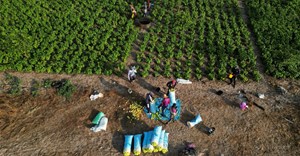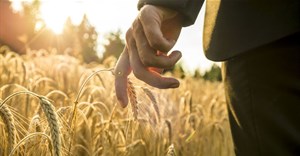
Subscribe & Follow
Is East African agriculture at risk of playing second fiddle to oil wealth?

What are the challenges to commercialisation of agriculture in Africa?
The greatest is how to take advantage of the tremendous opportunity presenting itself right now across Africa because of the shift in consumer behaviour and consumer demand globally towards higher quality agricultural products. This can potentially lift millions of farmers out of poverty and provides tremendous revenue generation potential and job growth. So the key challenge for governments is how to support the agriculture sector to take advantage of this.
In addition, you see many countries in the region are focused on mineral resources but once the commodities’ supercycle ends, agriculture will still be here. This poses a challenge because governments once had their eye on precious earth and mineral oil and forgot the principles for inclusive growth. East Africa must take advantage of this opportunity-based narrative.
The second biggest challenge is, of course, how countries can position themselves in the face of a volatile environment in terms of climate and international markets. We live in an age of increasing protectionism and with little regard for the principles of international trade; and that often leads to volatility rather than creating solidarity among countries through trade.
How about how Qatar, a desert country, which has reacted to being blockaded by its neighbours to the extent of importing cows so it can become self-sufficient in milk?
This is a reaction we would have recommended for small countries about 15 years ago rather than strive for integration into international trade, because that was a more efficient alternative then. But in 2008/9 when the first global food price crisis set in, we saw some countries ban food exports.
The main food exporters were Ukraine, Kazakhstan and Russia, but we saw them impose grain export bans that led to grain prices spiralling so that smaller countries like Tajikistan and Kyrgyzstan suddenly had no trading partner. Now we see more African countries also imposing export bans on maize rather than seeking opportunities to create trade. But I see hope and opportunity for Uganda. Uganda has two seasons and harvests twice a year, just when other countries need the grain.
The third challenge for these countries is how they can create a better institutional regulatory policy environment to enable the sector to grow. One needs to define the role of the state first. Is it to be an actor in the market, which means buying and selling? Or procuring and handing out inputs? No. Their role is more that of a facilitator, setting broad rules of the game and therefore, facilitating private sector activity.
The focus over the past decade by Uganda, Kenya, Tanzania and South Sudan has been on oil and gas exploration and now exploitation, which could hurt their immense potential in agriculture. How can they strike a balance?
Professionals like to talk about global best practice, good experiences and showcasing, but I think there are mistakes already made by others that we need to learn from. In this regard, finding oil reserves comes with tremendous opportunities, including energy independence, the promise of revenue for cash-strapped public budgets to benefit health, education, infrastructure and agriculture. Such is the promise that oil brings.
But what have we learnt about oil is that its attendant riches can be negative.
First, there is the impact on the exchange rate. If not well managed a country’s currency will appreciate, making import of food products cheaper, which will appear very attractive for the urban population in the short run. But in the long run, this can restrain the opportunity to grow agriculture.
Second, oil revenue bears the risk of financial governance problems and opens the doors to poor money management. If public finance management systems are lacking in terms of transparency and monitoring, there is a risk that some money ends up in pockets that it was not meant for, rather than going into education, health and infrastructure, but whether that risk manifests itself or not is a national decision.
Countries could invest part of this oil revenue in a sustainability fund to create a buffer for leaner times and also increase sustainability in the use of natural resources, including soil and water.
It would be tragic to ignore agriculture.
Source: African Agri Council

The African Agri Council is a network of global executives, decision makers and key stakeholders in Africa’s agricultural industry. We connect executives with their peers, policy makers, investors and financiers and leading global service providers across Africa and around the world.
Go to: http://www.agricouncil.org/articles/












